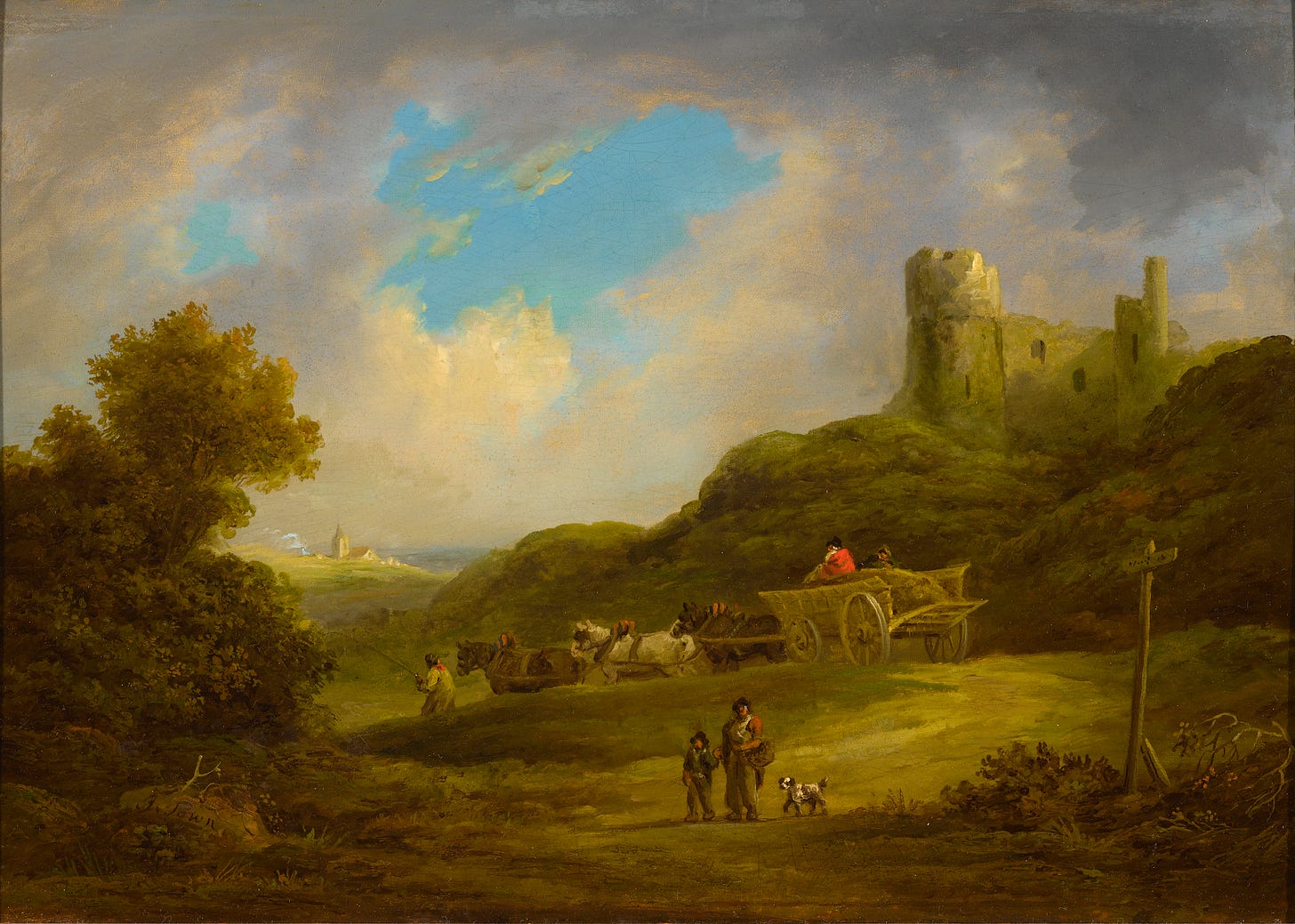“An Englishman’s home is his castle.”
Popular saying 1
For many British people of my age, the summer of 1976 stands out in memory as exceptionally hot and dry. In some parts of the country, it was the hottest summer in 350 years. This was before we became accustomed to temperatures in the 30s (Celsius) and long dry spells and Britain became a “hot country.”
In some parts of England it didn’t rain from June until September that year—which was highly unusual.
It was a summer of epic barbecues, glorious days at the beach, and an uninterrupted season of cricket (a rarity in a country that invented a sport that relied on dry weather, which you could never rely on).
But not for me. At the age of 14, I spent the summer holidays chasing cattle over the hills and valleys of mid-Devon, a herd of young Hereford- and Devon-Friesian crosses that repeatedly found the weak spots in every hedge or fence on the farm, breaking out of the crude, inadequate perimeter that I and my brother were asked to patrol.
My father, having briefly left farming, had just returned to it. He bought a farm at a time when land prices dipped and good farmland had become an attractive proposition.
And this farm had good sandy soil that drained well and could grow arable crops like wheat as well as pasture for cattle. Unlike the farm I’d grown up on, this one was not full of clay and rushes and semi-bog.
With this kind of soil, long spells of dry weather could dry out the fields and leave them short of grass. But in a wet county, this was unlikely to be an issue, he must have thought.
But in the summer of 1976, the normal rules didn’t apply.
The farmhouse had been the least attractive feature of this well-located farm. It was the kind of large, dingy Devon farmhouse that you’d put up with rather than enjoy. Some of the buildings attached to the house were derelict. The house itself was full of dark corners in which lurked grubby plaster and cheap paint. It was just about habitable (at the time, we were still living in the nearby town) but something of an eyesore.
That all began to change the day my parents stripped off some old parts of the ceiling to see what lay underneath. Instead of falling gently away to reveal a layer of rough brickwork as expected, the plasterboard collapsed altogether in places, revealing its secrets with scarcely a murmur.
And those secrets were a shock to my parents. Huge beams a metre thick in places and with what my mother described as “the muck of all ages” trapped in between. Beyond the dirt, sturdy wooden planks from the floor above were dimly visible.
What was clear was that much of the structure was made of wood and probably quite old. Exactly how old, we had no idea. So my father persuaded an old acquaintance, an antique dealer and amateur antiquarian, to come and take a look. He drove down the farm lane one Saturday afternoon.
According to the look on his face as he opened the door of his wooden-framed Morris Minor Traveller and glanced at the farmhouse, he wasn’t expecting too much from what appeared to be another grubby and undistinguished country dwelling. He’d probably seen hundreds of them across the county.
He shone his torch (flashlight) into the dark spaces revealed by the holes inexpertly ripped into the ceiling by my parents and took a look into the dark and filthy crevices above the existing ceiling.
When he re-emerged, his now slightly grimy face was shining in excitement.
“This looks like a Tudor farmhouse,” he pronounced to my astonished parents.
My mother was probably more shocked than impressed. She always preferred modern houses and their conveniences. But she recognised this was an opportunity, if nothing else, to add value to the property.
I suspect that my parents, neither of them strangers to hard manual work, decided then and there to strip off all the walls and ceilings themselves. Which also meant mobilising their small army of sons—or at least, those of us still living at home.
So that was my summer. Indoors, uncovering the secrets of an Elizabethan farmhouse, or rather disturbing decades (centuries) of dust and cobwebs and worse. We were used to farm work and all the muck that came with it, but this old dry filth was something different altogether. Despite daily baths or showers, we felt grimy all summer.
And outdoors, we chased those cattle.
The previous owners hadn’t planned for such an exceptional drought (and it’s hard to blame them). Because of the lack of rain, the stream the cattle would normally drink from had mostly dried up. But somehow we managed to get them enough water via the farm’s ancient system of water troughs.
However, the constant sun brought with it the nuisance of flies, which made the cattle restless. And as far as the cattle were concerned, the best bits of shade were always on the other side of the woefully inadequate fences.
So this motley assortment of black or brown and white steers and heifers would barge their way through gaps in fences and hedges and find themselves, with no fixed intentions, wandering across neighbouring farms and even the neighbours’ neighbours’ farms.
Like scouts in advance of a marching army, we’d set out to track them down in our hopelessly unsuitable Wellington boots that made our legs and feet sweat small rivulets. 2 Locating the heifers and steers resting innocently under the shade of some old oak on another farm, we’d persuade them with the aid of some shouting and the threat (never used) of a stick to return to our farm. We must have walked or run hundreds of dusty miles that sweltering summer.
After the cattle were safely restored to home territory, we’d do a quick repair of the fence and then get back to other tasks on the farm or on the restoration site indoors.
Retrieving the escaped cattle was a Sisyphean task, repeated on an almost daily basis. 3 We should, of course, have replaced the fence, but everyone was too busy with other things for that. And, after all, we all expected it to rain soon.
However, the rain didn’t come.
Before the summer break that year at school, I’d read Edwin Muir’s poem, The Castle. I didn’t know then that Muir was also a translator of Kafka, who in any case I’d never heard of.
So I couldn’t appreciate that for Muir the title of the poem would have been more loaded with meaning than the trailers of hay that waddled through the narrow lanes near the farm through June and July.
But I could appreciate the magical beginning of the poem that evokes a summer of both ease and indolence with its beautifully rolling, lazy opening line:
All through that summer at ease we lay.
The bucolic calm of this opening made the poem attractive to a farm boy like me. But while the defenders of the castle “watched the mowers in the hay,” they enjoyed an ease and indolence that was denied us.
It seems to me now that the defenders of Muir’s castle were like the old inhabitants of the house we’d bought—where the cattle might be brought under the same roof at night (though in a different enclosure) to protect them. In this way, they had a modest fortification against cattle rustlers.
One might have felt safe there, just as Muir’s defenders did:
For what, we thought, had we to fear…
In 1976, our sense of security had been in our certainty that the reliably wet local climate would bring rain to offset the initial shortcomings of this farm in terms of water supply and fencing.
This misplaced confidence left us unprotected, bringing us sometimes literally to our knees, as we chased the cattle as they roamed the county.
Of course, we continued our toil anyway, like the farmers in the fields outside the castle of the poem.
However, inside Muir’s castle, it was another kind of complacency and another kind of danger that were the downfall of the defenders.
To describe the denouement of his tale, Muir summons a rather childlike diction, almost as if he were writing a fairy tale. But he uses phonological crafting to dramatic effect as he describes
A little wicked wicket gate.
The wizened warder let them through.
The castle fell quickly, “without a groan.” The narrator laments that they were, though well fortified, defenceless against human greed (or was it need?):
Our only enemy was gold,
And we had no arms to fight it with.
In the outcomes of the drama of our torrid summer, we were luckier than the defenders of the castle in Muir’s poem.
Or so we thought.
Though the drought in our part of Devon continued into the beginning of September, it ended spectacularly with a huge storm. After that, the rain kept up for weeks. The temperature dropped. The streams filled up. The grass grew. As a result, the cattle were happier and began to stay in our fields.
We went back to school; old routines of study and sport reasserted themselves. And while our first rugby games of the season were cancelled due to the bone-hard pitch, by mid-October, we had a game cancelled due to a waterlogged pitch. The weather had reverted to the English mean.
And the house, by the end of the summer of furious work and improvised restoration, looked wonderful. Even some of the beautiful wall panelling had been preserved. The exposed beams, now cleaned and dark stained, seemed to flex proud muscles across the ceilings. There was a fireplace big enough to burn a small tree trunk. A building that had been little more than a blot on the landscape had become, at least in its interior, a kind of burnished treasure.
In September, we moved in.
All was well until winter came. Then the wind blew hard, and the frosts were unusually sharp. It snowed.
As the winter gripped the land, it turned out that some rooms in our newly restored Tudor farmhouse, this resplendent relic, were virtually impossible to keep warm. Perhaps the cold had lingered there from Elizabethan winters. And one of the chilliest parts of the whole house was my bedroom, the first one I’d had to myself.
The cold drove me out of it soon after Christmas.
Apparently, this saying can be traced to 1604 and a legal ruling by English judge Sir Edward Coke. He wrote, “that the house of every one is to him as his Castle and Fortress as well for defence against injury and violence, as for his repose.”
Expecting the usual damp summer, my parents hadn’t invested in more appropriate footwear for us, and our shiny white trainers from our town life were not suitable for farm work.
Only some years later would I read about this myth. It was probably via Albert Camus, who wrote, "One must imagine Sisyphus happy." Who knows, perhaps we were, too?












I enjoyed reading this, Jeffrey. Re running after the cattle: No horses for your roundups?
I feel the pain and surprise of renovation, which I've undertaken more than once. In one house, purchased in 1988, we decided the "finished" basement needed special attention and began pulling up the dingy carpeting, only to find years and years and decades of old newspapers, some wet. Those papers offered a fascinating exercise in learning the news of the day. Post-renovation, proper flooring installed, the musty smell was gone. We never did find out why some of the papers were wet, or why they'd been used.
I like your term for alliteration. What a mouthful!
What a tale, England's antiquity always gives me Tolkien goose bumps (to me that is a good thing). I recall during a remodel of the 80 year old house I have lived in for more than half its existence, I found old newspapers in a wall and was thrilled. Touching the past unexpectedly always seems to be electric. No cattle around. I confess to being a bit afraid of cattle in a field. wonderful and amusing, thank you Jeffrey.